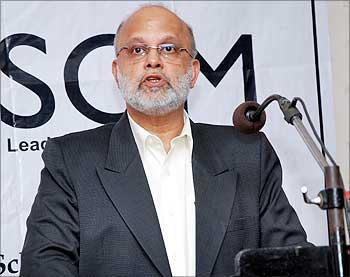It has been 25 years of entrepreneurship for Pramod Chaudhari. A successful entrepreneur, he describes his experience as an exciting journey full of ups and downs. After his engineering from the Indian Institute of Technology Bombay, Pramod Chaudhari worked for a multinational company for a few years. Later, he decided to start his own venture. Passionate about green technologies, he established Praj Industries in 1984.
It was not an easy ride. He failed many times but that did not deter him from taking new initiatives and moving ahead. His never-say-die attitude and optimism made sure he built a world-renowned company. Under his leadership, Praj focusses on offering innovative solutions to add value in bio-ethanol, bio-diesel, brewery plants and process equipment and systems for customers worldwide.
Praj has been creating innovative technology platforms to make biofuels a sustainable choice toward making a greener planet.
Praj was recently conferred the 'Forbes Best Under a Billion Company' in Asia, for the second consecutive year, based on its consistent growth and profitability over three years.
Chaudhari has also contributed to the National Biofuels Policy as a member of the Committee on Development of Biofuels, Planning Commission for introduction of renewable fuels to India.
He believes that innovation and entrepreneurship must go hand in hand to build sustainable solutions. Stressing the importance of intrapreneurships, he says, young managers within a company, who have good skills and ideas must be encouraged to develop their ideas. Chaudhari shares his views on entrepreneurship and his company's initiatives to promote green technology.
How difficult was it to leave a good job and start a venture on your own?
It was very difficult as I was working for a MNC. But my father had confidence that I will do something different. I told them that I will give it a try for about five years and I won't be a burden to them.
What are the core activities of Praj?
Our core business is to offer technology design and machinery for the production of bio fuels. We try to bring in green technology in our day-to-day activities, like green design, green manufacturing, energy efficient technologies and waste water treatment.
We operate on five parameters. Our products facilitate the use of bio fuels, our processes are green as they consumes less water and less energy. In all our processes we keep a tab on low energy consumption, lesser paper use. We also encourage our employees to take part in social activities related to the environment. So we complete the pentagon of green initiatives.
What is the market potential for biofuels?
It is a regulated market. The government has allowed 5 per cent blending of ethanol in fuel. There is a road map for 10 years so that will develop the market for bio fuels. There is a long way to go.
Praj offers technology, plants, and services for biodiesel production. Praj also offers a biofuels complex wherein one can produce both bioethanol and biodiesel. We do this business all over the world. We have our operations on all the five continents. We can make biofuels from different raw materials in a cost-effective manner. We are doing a lot of research in developing bio-commodities. Bio-commodities are biochemicals, which can be made from agricultural waste.
Hydrocarbon and carbohydrate products will co-exist. Hydrocarbon is a depleting resource and is adding more carbon dioxide to the environment. It will dry up one day whereas plants are a renewable resource.
What kind of challenges do you face?
It is a big challenge to make these products cost effective and commercially viable.
How do you see India's role in green technology area?
It is a new avenue. Thirty years ago, India was trailing by 20 years in terms of green technology initiatives. Today, we are almost close to the Western world. Thanks to the liberalisation that started in the 1990's, we are able to catch up with the West on many fronts, IT was the first.
We got the full benefit of IT and now it is stabilising. We are in the forefront of bio technology and green technology now. We have good talent in India so in terms of clean technology we are at par with the world.
Is there lot of market for start-ups in the clean technology area?
The market is huge. For new entrants, there is a document called NAPCC (National Action Plan for Climate Change), released by the Prime Minister Manmohan Singh last year. It lists ten missions like solar, water, etc. . . so each mission offers huge opportunity. The biggest will be solar projects. The outlay for solar mission will be announced on November 14.
Do you face a talent, manpower shortage?
We do not face any shortage. There is a huge talent available in tier-2 cities in Maharashtra and in other parts of the country.
You talked about intrapreneurs? How do you plan to encourage intrapreneurship?
We encourage our own employees to come up with ideas, take risks, be responsible to the bottomline. It could be a new design, new business model, etc. I feel this generation is very lucky as there is a lot of support. There are lot of government agencies and financial institutions to support them.
When I started there was hardly anything. So it depends on the risk-taking ability of entrepreneurs. So they should become intrapreneurs as there is a safety net in an organisation. So intrapreneurship is not a bad idea. It's not inferior to entrepreneurship. They may be as good as entrepreneurs.
The innovative contribution of entrepreneurs is supported by intrapreneurs to make a successful organisation.
Praj has launched the 'Maha-Intrapreneur Award' to recognise the efforts of intrapreneurs.
There is too much focus on services than product development in India. What are your views?
Service is not a bad idea. It requires lesser capital. The growth prospects, however, will be limited in terms of services. Service is good to create more employment.
For instance, if an entrepreneur wants to expand business in another place he must find an entrepreneur there and make him expand business, that way more people get involved without hiking his overhead costs.
To develop products, you need a lot of capital. But there are agencies and venture capitalists that can help you with he capital as well. However, making a product or a prototype takes a long time or you need a lot of patience.
There is a gap in the funding for many start-ups as angel funding dries up and VCs find it small-ticket business. So many technologies don't see the light of the day. The gap between angel funding and VCs needs to be bridged.
What do you think about talented Indians going abroad to work?
This is changing now. During my college days, it used to be so. About 80 per cent of my classmates went abroad. But now reverse brain drain is taking place. There is a herd mentality here, if your neighbour is rich, has a car, etc, then you too must be at par with him. . . .
What are the reasons for your success?
I really don't know. I don't have a recipe for success. I believe that one has to be very lucky and be at the right place at the right time. You have to go on trying, put in a lot of effort till Lady Luck smiles at you. I have hit the bottom twice but my optimism helped me survive.
What would be your advice to entrepreneurs?
The decision to become an entrepreneur itself is a great achievement. Creating value for whatever product or service is good. However, the focus must be to offer a solution for the society, solutions to make this planet a better place.
Source: rediff.com



No comments:
Post a Comment